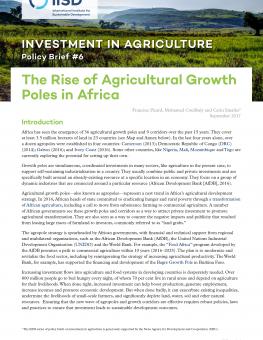
The Rise of Agricultural Growth Poles in Africa: Investment in Agriculture Policy Brief #6
Africa has seen the emergence of 36 agricultural growth poles and 9 corridors over the past 15 years. They cover at least 3.5 million hectares of land in 23 countries. Ensuring that the new wave of agropoles and growth corridors is effective requires robust policies, laws and practices to ensure that a possible new trend of investment helps Africa achieve the sustainable development goals the continent has set.
Africa has seen the emergence of 36 agricultural growth poles and 9 corridors covering at least 3.5 million hectares of land in 23 countries. Ensuring they are effective tools to promote agro-industrial development requires robust policies, laws and practices.
A number of African governments see these growth poles and corridors as a way to attract private investment to promote agricultural transformation. They are also seen as a way to counter the negative impacts and publicity that resulted from leasing large tracts of farmland to investors, commonly referred to as “land grabs.”
Agriculture is increasingly seen as the driving force for economic transformation in Africa. Increasing investment flows into agriculture and food systems in developing countries is desperately needed. Over 800 million people go to bed hungry every night, of whom 70 per cent live in rural areas and depend on agriculture for their livelihoods. When done right, increased investment can help boost production, generate employment, increase incomes and promote economic development. But when done badly, it can exacerbate existing inequalities, undermine the livelihoods of small-scale farmers, and significantly deplete land, water, soil and other natural resources.
Many attempts to attract responsible and sustainable investment to African agricultural have failed. Ensuring that the new wave of agropoles and growth corridors is effective requires robust policies, laws and practices to ensure that a possible new trend of investment helps Africa achieve the sustainable development goals the continent has set.
This policy paper identifies challenges and opportunities of current agricultural growth poles, outlines the role of laws, policies and institutions and describes three key stages for the development of a responsible agricultural growth pole.
Participating experts
Additional downloads
You might also be interested in
CSDDD: EU's Due diligence law vote should drive supply chain sustainability efforts
The European Parliament has voted to adopt the Corporate Sustainability Due Diligence Directive, aiming to address the environmental and social impacts of the supply chains of Europe's large corporations.
IISD Mourns the Passing of Ciata Bishop, Advisor and Advocate for Responsible Agricultural Investment
IISD is saddened by the recent loss of Ciata Bishop, a longtime friend and advisor to our team, and a passionate advocate for ensuring that investment is conducted sustainably and with the involvement of the communities affected.
Mahembe Coffee
This case study analyzes the extent to which a small agribusiness in Rwanda complies with international standards for responsible investment in agriculture.
LIMBUA Group Limited
This case study analyzes the extent to which a small agribusiness in Kenya complies with international standards for responsible investment in agriculture.